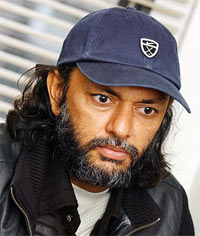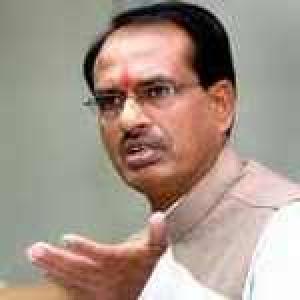 Rakeysh Omprakash Mehra, whose film Rang De Basanti (2006) helped change the way we look at socio-political injustice, vents his angst this Republic Day.
Rakeysh Omprakash Mehra, whose film Rang De Basanti (2006) helped change the way we look at socio-political injustice, vents his angst this Republic Day.
Both society and films are part of the problem, but they can be part of the solution as well, Mehra says, as Subhash K Jha listens.
As a thinking, socially conscious filmmaker, what troubles you about the state of the nation?
Where do I start? I’ve been troubled about various things in our socio-political system. The happenings of the last one month have made us all sit up and take note and vent our anger.
At least now the nation has come to a dialogue. I feel after the first Republic Day of Independent India, this is the most crucial Republic Day in the history of our nation.
Republic Day gives us the right to vote. The Constitution is an important tool for social remedies. We must know how to use its finer print.
There’s talk of boycotting celebrations in protest against the heinous gang rape in Delhi. But we achieve nothing by staying away. How can we say we won’t be part of the Republic Day when all of us are a part of Independent India?
Of course we are angry, disgusted and anguished. Thanks to the overall conscientiousness of the common people and the media, the anguish has spilt over onto the streets. But, then, crimes against women have been happening all along. The number of rapes in Delhi was around 500 last year and in Mumbai it’s around 350. But move ahead. In Madhya Pradesh it is 12,000 cases and in Bengal it’s around 10,000 crimes against women.
What would you like us to do?
This Republic Day we should take a pledge to go out and vote. That’s the empowerment which the Constitution has given us. We should all promise ourselves that India will have 100 per cent voting in 2014.
The vote is just one half of the pledge we should make. The other half is to vote the correct people into power. Our votes are sacred, and secret. We are all free to vote according to our conscience, unless it’s some village in Madhya Pradesh where dacoits control the ballot.
By and large the ballot is given to us unconditionally. We must therefore never vote for a party on caste-lines, or on the lines of rich or poor. Why should a Hindu vote for a Hindu or a Muslim for a Muslim, upper caste for upper caste and lower caste for lower caste?
We should only vote for the right candidates.
This will give us a political party with the maximum number of honest, efficient administrators. We must certainly not vote for any candidate who has been accused of corruption.
We must vote for people who know how to get the job done and who know they are the servants and not masters of the people. They must know that by voting, we are employing the candidates to run the country for us.
Politicians have become more accountable now. Om Prakash Chautala and his son have just been sent to jail.
I immediately tweeted, ‘India on the move’. We aren’t so gullible any more that we can’t tell who’s a thief and who is not.
We choose to turn a blind eye. I am so happy that there was an upsurge of outrage after the incident. But the sad thing is it took such an incident to awaken people’s collective conscience.
Let’s not divert from the issue. Why blame the policemen for what happened? There are 20 crore people and 93,000 policemen who are deplorably underpaid.
Why are the managers of our country not looked after as well as the managers of private companies? Look at Singapore. The highest-paid official in Singapore is the Premiere. He gets even more than the richest businessman there.
If politicians and government officers are well paid, their chances of becoming corrupt would be drastically diminished.
Gone are the days when a Member of Parliament was paid Rs10,000, given one apartment and an Ambassador car. Their counterparts in all other walks of life are driving around in BMWs. So give our MPs BMWs to move around in. That’s how organisations are run.
BMWs for our netas?
Earlier we were fighting the British Raj. Today, we are fighting social inequality and social injustice.
We have to look after the army well so that they can defend our country. And if we don’t look after the police force, how can we expect them to look after the internal law and order?
In order to bring about reforms, we first need to change the person who stares back at us in the mirror every morning. The moment we do that, there will be a paradigm shift. The moment the individual learns to respect himself, the rest follows.
 What do you think has changed in the last few months?
What do you think has changed in the last few months?
We have a wonderful opportunity to turn around our socio-political system. This has come to us now after 65 years. It has come to us after great peril, after so much struggle, wars, droughts, famine and poverty, floods, after the Emergency.
This awareness and awakening has come to us after a great struggle. We should stop complaining and just do the right thing.
Your film Rang De Basanti showed the power of silent protest. Now people are cynical about candle-light vigils…
Nothing is ineffective. As an old teacher of mine said, ‘Nothing goes to waste.’
How do we define a character in our movies? By their deeds. We are what we do. If we go out in a silent procession with a candle in our hands, we are still protesting effectively.
If you were to make Rang De Basanti today, would the forms of protest be different?
I think the issues have changed. The spotlight has shifted from governance to the governed, from politicians to the people. I’d have shown more protest from the people. We are living through fabulous and dynamic times.
You were severely condemned by some critics for showing your heroes killing politicians at the end of Rang De Basanti.
It was an inevitable step-by-step movement in the plot. First, the heroes were complacent. They just wanted to have fun, or they didn’t want to do anything about the corruption around them, or they were a persecuted minority in their own homes.
And then that change happened. But they really didn’t know what to do with that awakening until (they felt) a personal loss. That’s when they went out and raised their voices.
Then comes civil revolution. But we didn’t want to show a civil revolution. The core idea was to rise above ourselves. We need to do that. Even in the film industry.
Can you explain that?
This gender bias that we see in society is rampant in our movies. One is embarrassed and ashamed to see the film fraternity propagating and celebrating gender bias in a big way.
And then we have awards functions where this bias is turned into television entertainment. Tragically, our own iconic actresses choose to act out the bias. It’s girl power working against girl power.
Why do they do it? Is it desperation for food? No, it’s not poverty. It’s just lust for instant fame and money.
You think movies and the way they project actresses are definitely sending out wrong signals?
Thankfully, not all movies. But a majority, yes.
It’s all about easy bucks, easy fame. This is not art. It’s commerce at its most immoral.
Every business has its ethics. The practice of dancing for big bucks is unethical. I say this with a cool, balanced mind.
Being a movie-maker, I am appalled at how the lines of morality can get blurred for me. I have to stop and think: am I doing the right or the wrong thing?
Every filmmaker needs to be careful about what is shown.
I don’t think I will see an item song in your film?
I think the item song has been blown out of all proportion. It’s being unnecessarily hyped. If there’s nudity in a film and if it is essential to the theme, as it was in Shekhar Kapoor’s Bandit Queen, then it is permissible.
Likewise, if the item songs are part of a story, then it’s okay. But they are just there for titillation most of the time. And that’s dangerous.
We have been given the power in our hands to mould thoughts and influence mindsets. We shouldn’t become like monkeys with razor blades in our hands.







